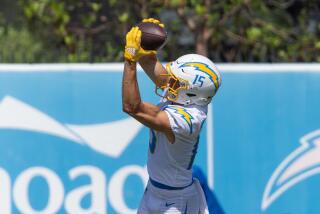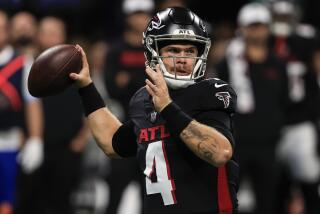Analysis: Chargers’ move a risky proposition for more than just the team

The Chargers are leaving San Diego for Los Angeles. Owner Dean Spanos announced the decision in a letter posted on the team’s website Jan. 12. (Jan. 12, 2017)
- Share via
Gambling isn’t allowed in the NFL, but this Chargers relocation feels like one big roll of the dice.
There’s extreme anger in San Diego, where betrayed fans are discarding their Chargers jerseys in front of team headquarters. And there’s apathy in Los Angeles, where the arrival of a second team was met Thursday with a collective yawn.
It’s a bad look for the NFL in the middle of the playoffs, and it’s a risky proposition in a season when TV numbers have taken a significant dip.
The league has long looked at Los Angeles as a two-team market, but this isn’t the way it wanted to solve the Rubik’s Cube. Now, there’s a real chance that three cities will lose their teams in rapid-fire succession — St. Louis, San Diego and, possibly, Oakland — and the fickle Los Angeles engine will be flooded.
For two decades, Los Angeles was more valuable to the league without a team than with one. It was the threat that stadium-hungry teams could use to get their cities to pony up and help pay for new venues. Now that threat is gone. There’s no more room at this inn.
One of the arguments the Chargers had made over the years in considering Los Angeles is they didn’t want to be like the old New York Jets playing at Giants Stadium. They wanted to be equal partners, not second-class citizens. Now, there’s no question. They are the tenant, and the Rams are the landlord.
To get a foothold in this market, the Chargers have to differentiate themselves in a good way. They can do that by winning, but it’s not as if they haven’t been trying to win to this point. There’s no guarantee of that. They have to do more.
“None of us are expecting a thing where you just flip a switch and this is all going to happen overnight,” Chargers President Dean Spanos said. “This is going to be a work in progress. I hope it takes a couple, three years. Maybe we’re successful, … [and if] things turn around very quickly in the next few years that’s really going to help.”
It’s an innovative idea for them to play in the 30,000-seat StubHub Center. But it could also be a colossal failure. Although they haven’t announced ticket prices, they think they can charge substantially more for an up-close, exclusive experience. While that might work on a one-off, novelty basis, it’s going to be tough to sustain, especially in a market that for two decades has consumed the NFL from the couch. Maybe more than other places, NFL fans here love their football on TV.
Speaking of TV, for all that time Los Angeles was without a team, this market routinely got the most desirable matchups. There were some exceptions, but for the most part, this town had a great lineup of games. That’s going to change. We will get Rams and Chargers games every Sunday, and judging by recent history, that’s going to leave a lot of people unhappy. The real beneficiary could be DirecTV, because more NFL fans are going to sign up for “Sunday Ticket” so they won’t miss the best games.
The NFL likes competition on the field, but not between its owners. It doesn’t want those billionaires clashing in the same market over the same advertisers, sponsorships, potential season-ticket holders, and the like. It happens, but the league would rather avoid it. The two Los Angeles teams are sure to butt heads, and even had to share media attention Thursday, with the Chargers arriving in town and the Rams hiring a new head coach. (In a bit of unfortunate timing for the Chargers, it trickled out that they were on the verge of hiring a new coach, a bit of positive news that they could have back-pocketed for another rainy day.)
For the league, the timing of this was painfully awkward. Hours before the news leaked that Spanos had decided to leave, NFL Commissioner Roger Goodell had pushed back the Sunday decision deadline by two days so it wouldn’t conflict with the playoff games or the Martin Luther King holiday. That briefly created false hope among lots of San Diego fans that the Chargers might take one last look at the situation before turning out the lights.
As soon as Wednesday’s meeting of the finance and stadium committees had ended, Spanos was on the phone to tell Goodell and some of this fellow owners he was leaving San Diego. Granted, the stadium saga had dragged on for a maddening 15 years, but the end seemed as awkward and rushed as the team’s hastily designed LA logo.
The Chargers have stumbled into the market uninvited. Can they regain their footing? And more important, will anyone care if they do?
Follow Sam Farmer on Twitter @LATimesfarmer
ALSO
Chargers in StubHub Center? What’s wrong with the Rose Bowl?
Column: Chill out, there is little downside to the Chargers coming to Los Angeles
Shaikin: Chargers’ task to win over L.A. is like climbing ‘Mt. Everest’
More to Read
Go beyond the scoreboard
Get the latest on L.A.'s teams in the daily Sports Report newsletter.
You may occasionally receive promotional content from the Los Angeles Times.











